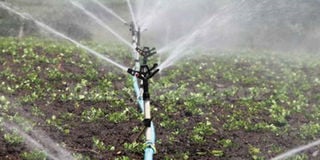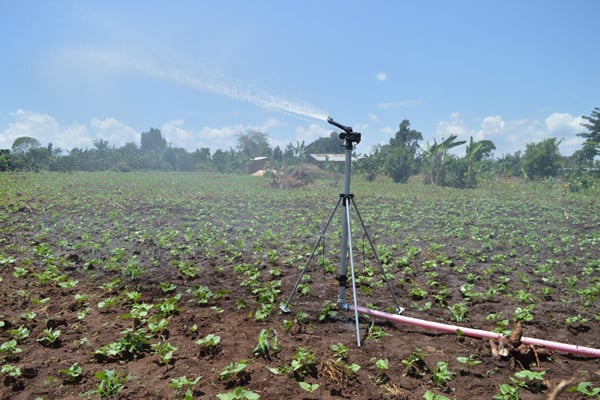Shs75b irrigation project to boost rice production in Kween

Agriculture: An irrigation system on a vegetable farm. Such systems remain just a dream for many farmers in Uganda due to high costs of installation and maintenance. PHOTO/FILE.
What you need to know:
- 7,000: The number of people set to benefit from the Atari Irrigation Scheme
For years, rice farmers in the Atari basin area in Kween District and some parts of Bulambuli District have faced a challenge of lack of enough water to grow rice, especially during the dry season.
Similarly in the rainy season, the farmers harvest less due to floods that submerge their gardens.
Mr Sam Chebet, a rice farmer, said: “Any intervention that is geared towards earning more from growing rice is welcome because this is our only source of livelihood.”
However, this is likely to change following the construction of the Atari Irrigation Scheme worth Shs75 billion by the Japan International Cooperation Agency (JICA) in partnership with the government through the Ministry of Agriculture.
The scheme, whose construction is set to start this year, will sit on a 680-hectare piece of land and will benefit about 7,000 farmers.
In an interview with the Monitor at the weekend, Mr Paul Lubega, the programme officer of agriculture at JICA Uganda, said the scheme will not only curb flooding but also increase production from 1.2 metric tonnes per acre to four metric tonnes per acre.
Mr Lubega added that during the rainy season, the area experiences a lot of flooding and farmers rarely have access to their gardens from either side of River Atari.
“If this scheme is established, farmers will be in position to increase productivity and also to manage vagaries of weather including floods,” he said.
He added that for the past year, they have been on the ground implementing a project on sustainable utilisation of the scheme.
“We have formed Irrigation water users association because we want to equip the local people to manage and operate the scheme on their own without our interventions,” he said.
The project will also introduce disease and bird-resistant variants of rice to the farmers in an effort to increase production.
Mr Yasin Chemaswet, another rice grower, said they tried to resist the project at first due to lack of information.
“We thought they wanted to grab our land, that is why we were resisting but later on, we were told that after constructing, they will leave the irrigation for us to manage,” he said.
Mr Micheal Sabila, a rice farmer, said they have so far been trained on good farming practices including line planting, spacing and water management.
“When the irrigation scheme is finally here, we will be in a position to control water from moving recklessly in our gardens because the water channels will direct water and also farm roads to ease transportation of our harvest,” he said.
The Chief Administrative Officer, Ms Albina Awor, said the construction of the scheme should be sped up.
“There is a lot of rice growing but the farmers use rudimentary means. We are hopeful that with the scheme, it will increase the quantity of rice harvested,” she said.
Mr Kenichiro Kobayashi, the chief advisor of the JICA-Atari Irrigation Scheme, said Uganda has rich water resources which can be tapped to promote irrigation.
“The government should recruit more staff to manage irrigation and train farmers to embrace irrigation farming,” Mr Kobayashi said.




